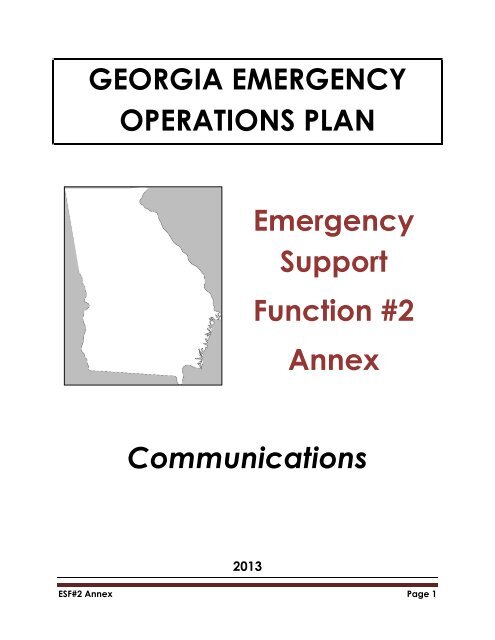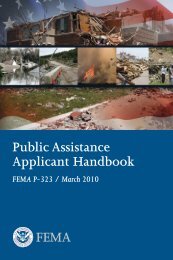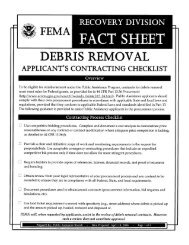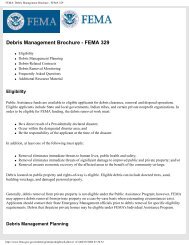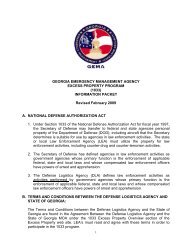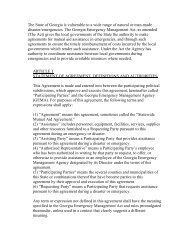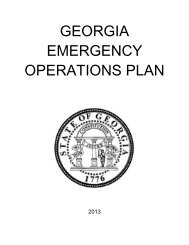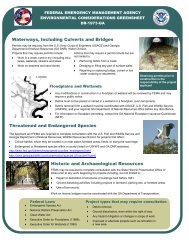ESF 2 -Communications - GEMA/Homeland Security
ESF 2 -Communications - GEMA/Homeland Security
ESF 2 -Communications - GEMA/Homeland Security
Create successful ePaper yourself
Turn your PDF publications into a flip-book with our unique Google optimized e-Paper software.
GEORGIA EMERGENCY<br />
OPERATIONS PLAN<br />
Emergency<br />
Support<br />
Function #2<br />
Annex<br />
<strong>Communications</strong><br />
2013<br />
<strong>ESF</strong>#2 Annex Page 1
<strong>ESF</strong> Coordinator<br />
Georgia Emergency Management<br />
Agency/<strong>Homeland</strong> <strong>Security</strong><br />
Primary Agency<br />
Georgia Emergency Management<br />
Agency/<strong>Homeland</strong> <strong>Security</strong><br />
Support Agencies<br />
American Radio Relay League, Inc.<br />
Board of Regents of the University System of<br />
Georgia<br />
Georgia Department of Administrative<br />
Services<br />
Georgia Department of Defense<br />
Georgia Department of Natural Resources<br />
Georgia Department of Public Safety<br />
Georgia Department of Transportation<br />
Georgia Bureau of Investigation<br />
Georgia Forestry Commission<br />
Georgia Public Broadcasting<br />
Georgia Technology Authority<br />
Public Service Commission<br />
INTRODUCTION<br />
Purpose<br />
<strong>ESF</strong>#2 – <strong>Communications</strong> is responsible for providing notification of certain impending or<br />
occurring natural or man-made emergencies, communications support to response<br />
efforts during incidents requiring a State response, and support and coordination of<br />
State and or Federal resources to assist in recovery services to restore the<br />
communications infrastructure following an event. <strong>ESF</strong>2 is responsible for coordinating<br />
telecommunication services when disaster recovery centers are established and for<br />
coordinating with Federal <strong>ESF</strong>#2 partners during Presidentially Declared disasters.<br />
Capabilities<br />
Members of <strong>ESF</strong># 2- <strong>Communications</strong> include the supporting state agencies listed<br />
above and numerous commercial telecommunication service providers. <strong>ESF</strong>#2<br />
members have a wide array of responsibilities which include planning for tactical<br />
communications support during an emergency and conducting activity to aid in the<br />
restoration of landline and wireless telecommunications infrastructure damaged during<br />
an event. Numerous pre and post disaster activities must be undertaken to accomplish<br />
these responsibilities.<br />
These activities include:<br />
<br />
Pre-event planning and coordination with supporting agencies and private<br />
industry<br />
<strong>ESF</strong>#2 Annex Page 2
Support of continuity of operations and continuity of government plans as they<br />
relate to re-establishing State command and control locations and/or multiagencies<br />
coordination centers (specifically, to provide and/or help restore<br />
communications capabilities at an alternate state government administration<br />
site and/or alternate SOC site)<br />
Support of State of Georgia agencies (and special purpose teams fielded by or<br />
sponsored by the State such as IMTs and SAR teams) in response to<br />
Gubernatorial-declared states of emergency- particularly as it relates to<br />
supporting incident command locations / areas of operations within an ICS<br />
framework (specifically, to provide and/or help restore communications<br />
capabilities at incident command posts/forward operating bases, forward<br />
areas/tactical operating areas, and staging areas for state personnel and/or<br />
state-sponsored teams moving through or working within those areas in response<br />
to events such as hurricanes, earthquakes, and other natural and technological<br />
regional emergencies/disasters)<br />
Support State of Georgia agencies in the following: Repatriation operations<br />
where assistance is requested by a State of Georgia agency; national disaster<br />
medical systems (NDMS) operations where assistance is requested by a state<br />
agency, to include Disaster Medical Assistance Team (DMAT), Disaster Mortuary<br />
Operational Response Team (DMORT), National Veterinary Response Team<br />
(NVRT) and National Medical Response Team (NMRT); and strategic national<br />
stockpile (SNS) operations where assistance is requested by a State of Georgia<br />
agency<br />
Support EMAC requests to and from surrounding states in FEMA Region IV<br />
Support training classes for <strong>GEMA</strong>/HS-sponsored all hazards COM-L<br />
(communications leader) and COM-T (communications technician) classes,<br />
<strong>GEMA</strong>/HS-sponsored interoperability and disaster response exercises<br />
Support the State in response to planned and unplanned major events that must<br />
be managed to prevent and/or reduce incidents of an emergency nature<br />
Coordination of and assistance in restoration of commercial communications<br />
infrastructure<br />
Publishing situational updates, status reports and related information routinely<br />
during an event<br />
Concept of Operations<br />
<strong>GEMA</strong>/HS activates <strong>ESF</strong>#2 when a significant impact to the communications<br />
infrastructure is expected or has occurred. When activated, <strong>ESF</strong>#2 performs tasks that<br />
can be categorized within three primary functions. These functions may include, but are<br />
not limited to, Tactical <strong>Communications</strong>, Infrastructure Restoration, and<br />
<strong>Communications</strong> Planning.<br />
<strong>ESF</strong>#2 Annex Page 3
The Tactical <strong>Communications</strong> function includes the following activities:<br />
Identifying emergency communication requirements for incidents based on<br />
existing plans and information provided immediately prior to or during incidents<br />
Identifying available emergency communications frequencies, services and<br />
equipment based on existing plans and resource database(s)<br />
Distributing available emergency communication equipment to incident<br />
personnel pre-deployment in existence with existing plans; with potentially limited<br />
distribution outside existing plans and/or post-event<br />
The Infrastructure Restoration function includes the following activities:<br />
Coordination with private industry partners to restore the commercial<br />
communications infrastructure<br />
Synchronizing efforts between private sector communication service providers<br />
and response and recovery operations<br />
Assist with coordinating access, security, and staging for essential<br />
communication service providers’ crews and equipment<br />
Reporting status of outages and restoration efforts to the <strong>Communications</strong><br />
Planning Branch as reported by communication service providers<br />
The <strong>Communications</strong> Planning function includes the following activities:<br />
Pre-event communications planning<br />
Developing communications input to the Incident Action Plan during an event<br />
Gathering and consolidating data for situational reporting during an event<br />
RESPONSIBILITIES<br />
<strong>ESF</strong> Coordinator<br />
The Georgia Emergency Management Agency/<strong>Homeland</strong> <strong>Security</strong> is the coordinator<br />
for <strong>ESF</strong>#2 and in partnership with the <strong>ESF</strong>#2 supporting agencies; <strong>GEMA</strong>/HS is<br />
responsible for <strong>ESF</strong>#2 planning, preparedness, response and recovery activities.<br />
Georgia Emergency Management Agency/<strong>Homeland</strong> <strong>Security</strong><br />
Plans and coordinates preparedness, response, recovery, and mitigation<br />
activities pertaining to <strong>Communications</strong>.<br />
Conducts ongoing <strong>ESF</strong>#2 meetings and / or conference calls.<br />
Supports and participates in planning meetings and exercises relating to <strong>ESF</strong>#2.<br />
Maintains ongoing contact with <strong>ESF</strong>#2 primary and support agencies.<br />
Acts as a liaison between <strong>ESF</strong>#2 and external entities.<br />
Directs requests for assistance to the appropriate <strong>ESF</strong>#2 primary agencies.<br />
Directs unmet requests for assistance to <strong>ESF</strong>#5 – Emergency Management.<br />
<strong>ESF</strong>#2 Annex Page 4
Provides information on the status, threats, impacts, or restoration of the<br />
communications infrastructure or services in conjunction with <strong>ESF</strong>#3- Public Works<br />
and Engineering, <strong>ESF</strong>#5- Emergency Management, <strong>ESF</strong>#7- Logistics<br />
Management and Resource Support, <strong>ESF</strong>#12- Energy, <strong>ESF</strong>#13- Public Safety and<br />
<strong>Security</strong>, and <strong>GEMA</strong>/HS critical infrastructure protection (CIP) program personnel.<br />
Provides updates on the status of <strong>ESF</strong>#2 mission assignments to <strong>ESF</strong>#5, the<br />
Planning Section Chief, and other entities external to <strong>ESF</strong>#2.<br />
Generates, in a timely manner, information to be used in briefings, situation<br />
reports, and incident action plans when the SOC is activated.<br />
Primary and Support Agencies/Organizations<br />
American Radio Relay League, Inc.<br />
Personnel<br />
Equipment<br />
Board of Regents of the University System of GA<br />
Provides use of property and utilities to temporarily host fixed/portable<br />
communications equipment<br />
Provides use of portions of network for voice/data transport when hosting<br />
fixed/portable communications equipment<br />
Department of Administrative Services<br />
Establishes pre-disaster contingency contracts for anticipated critical equipment,<br />
supplies and services needed to support State disaster response and recovery<br />
operations.<br />
Conducts emergency leasing, rental, purchasing and contracting for critical<br />
equipment, supplies and services to support State response and recovery<br />
operations.<br />
Provides state purchasing cards to State personnel to support State disaster<br />
response and recovery operations.<br />
Department of Defense<br />
Provides equipment and personnel and executes several core capabilities in<br />
support of State disaster operations including: command and control;<br />
transportation; communications; aviation; logistics; staging areas; power<br />
generation; and security.<br />
Department of Natural Resources<br />
Provides facilities to serve as temporary sites for fixed/portable communications<br />
equipment. Provides personnel, equipment and vehicles to support such sites.<br />
Provides access to LMR system(s) for disaster response communications.<br />
<strong>ESF</strong>#2 Annex Page 5
Department of Public Safety<br />
Provides COML and COMT subject matter expertise, access to the Georgia<br />
interoperability network (GIN) components, cache radios and other<br />
communications equipment.<br />
Provides security, traffic control and transport services for communications<br />
equipment and personnel responding to disaster incident locations.<br />
Provides access to LMR system(s) for disaster response communications.<br />
Department of Transportation<br />
Provides assistance with coordinating the emergency movement of<br />
communications assets and personnel.<br />
Provides information regarding the condition, accessibility, and suitability of<br />
roads and bridges, rail lines and airports necessary to support State disaster<br />
communications operations.<br />
Georgia Bureau of Investigations<br />
Personnel<br />
Equipment<br />
Provides access to LMR system(s) for disaster response communications.<br />
Georgia Forestry Commission<br />
Provides COM-L and COM-T subject matter expertise, access to cache radios<br />
and other communications equipment.<br />
Provides access to LMR system(s) for disaster response communications.<br />
Georgia Public Broadcasting<br />
Provides access to television and radio networks for purposes of non-EAS public<br />
notices and information to the public via <strong>ESF</strong>#15- External Affairs<br />
Use of property and utilities to temporarily host fixed/portable communications<br />
equipment<br />
Georgia Technology Authority<br />
Provisioning of voice and data services in accordance with state contract in<br />
accordance with the Georgia infrastructure transformation (GAIT) parameters.<br />
Provides frequency coordination for disaster communications and petitions of<br />
waivers to the FCC on behalf of State agencies.<br />
Public Service Commission<br />
Provides information about telecom companies within the State, liaisons with<br />
telecom companies regarding service disruptions, waivers and long-term<br />
restoration plans and progress.<br />
<strong>ESF</strong>#2 Annex Page 6
<strong>ESF</strong> COORDINATION WITHIN STATE OPERATIONS CENTER<br />
<strong>ESF</strong># 2 will report all activities to the <strong>ESF</strong>#5 Situation Unit for inclusion in the development<br />
of incident action plans and situational reports. All public information reports regarding<br />
<strong>ESF</strong>#2 activities will be coordinated with <strong>ESF</strong>#15 – External Affairs.<br />
When <strong>ESF</strong>#2 is activated, Georgia Emergency Management Agency/<strong>Homeland</strong><br />
<strong>Security</strong> , with assistance from supporting departments and agencies, assesses and<br />
responds to requests for assistance and planning or technical assistance from impacted<br />
local, state or federal agencies or other <strong>ESF</strong>s.<br />
In addition to the SOC, <strong>ESF</strong>#2 may provide personnel and/or equipment to field<br />
operations established in Georgia, including but not limited to: state incident command<br />
posts (ICP) state forward operating bases (FOB), Joint Field Offices (JFO), Disaster<br />
Recovery Centers (DRC) and any other incident facility established to meet operational<br />
demands for each particular incident requiring the activation of the GEOP.<br />
COORDINATION OF EMAC REQUESTS<br />
The Emergency Management Assistance Compact (EMAC) is a national mutual aid<br />
agreement between the 50 states, Puerto Rico, the U.S. Virgin Islands and the District of<br />
Columbia. It is based on 13 Articles which have been enacted into state law by each<br />
state. In Georgia, EMAC is addressed in the O.C.G.A., Title 38, Chapter 3, Article 5.<br />
States may only request assistance via EMAC when their governor has declared a state<br />
of emergency. EMAC requires that the state requesting assistance reimburse the state<br />
that provides the assistance. The Director of <strong>GEMA</strong>/HS is the EMAC Authorized<br />
Representative (AR) for the State of Georgia. The AR is tasked with the authority to<br />
commit and accept resources through EMAC partnerships. The AR may delegate this<br />
authority to the Operations Director, Deputy Operations Director and Finance Director<br />
of <strong>GEMA</strong>/HS. The <strong>GEMA</strong>/HS Logistics Program Manager is the designated contact (DC)<br />
for EMAC. In the absence of the Logistics Program Manager, the agency has identified<br />
alternate designated contacts. The DC is commonly referred to as the EMAC<br />
Coordinator. The DC coordinates EMAC operations and prepares the official EMAC<br />
Request for Assistance (commonly referred to as the REQ‐A). When completed, the<br />
REQ‐A becomes a contract between the requesting and assisting states for the<br />
provision of assistance in accordance with EMAC. When the SOC is activated, the<br />
Logistics Section Mutual Aid Unit coordinates and manages EMAC missions. This unit will<br />
be initially staffed with <strong>GEMA</strong>/HS personnel, but will likely be augmented by trained<br />
EMAC personnel from other states as soon as possible. This unit is also referred to as an<br />
EMAC “A” Team.<br />
<strong>ESF</strong>#2 Annex Page 7
<strong>ESF</strong>#2 will coordinate all EMAC requests with the <strong>GEMA</strong>/HS EMAC DC or the SOC<br />
Logistics Section Mutual Aid Unit, when the SOC is activated. No resource (personnel or<br />
equipment) may deploy to another state via EMAC until the REQ‐A has been approved<br />
and signed by the ARs of the requesting and assisting states, and they have been<br />
provided a copy of the REQ‐A, briefed and prepared for the mission. To facilitate<br />
obtaining any assistance Georgia may need via EMAC, state <strong>ESF</strong>s should identify their<br />
shortfalls in capability and where resources may be obtained to provide this capability.<br />
This may be accomplished via informal coordination with sister agencies in other states<br />
to determine if the needed resource is available for potential deployment to Georgia,<br />
its location and the point of contact for the resource. Such information is critical in<br />
expediting a request for assistance via EMAC. For more information on EMAC, contact<br />
the <strong>GEMA</strong>/HS EMAC Designated Contact at 404‐635‐7200.<br />
<strong>ESF</strong> ACTIVATION, EXERCISE & IMPROVEMENT PLANNING<br />
<strong>GEMA</strong>/HS systematically coordinates and conducts event debriefings and compiles<br />
after action reports for any incident that calls for the activation of all or any portion of<br />
the GEOP. <strong>ESF</strong>#2 shall participate in this process when applicable. After Action Reports<br />
will document areas for improvement, resource shortfalls and corrective action<br />
planning requirements which will be incorporated into the GEOP, its annexes or <strong>ESF</strong><br />
SOGs when applicable.<br />
<strong>GEMA</strong>/HS conducts all exercises within the structure provided by the <strong>Homeland</strong> <strong>Security</strong><br />
Exercise Evaluation Program (HSEEP). <strong>ESF</strong>#2 will participate in all exercise activities when<br />
applicable and will follow the HSEEP process to include active participation in planning<br />
and evaluation meetings, workshops and conferences.<br />
DEVELOPMENT OF STANDARD OPERATING GUIDES<br />
The <strong>GEMA</strong>/HS Planning Section will provide standard operating guide development<br />
templates and planning assistance to all <strong>ESF</strong>s listed in the 2010 GEOP. All <strong>ESF</strong>s will strive<br />
to develop operationally ready SOGs for inclusion in the GEOP. <strong>ESF</strong>#2 will meet as<br />
necessary to develop, review and refine SOGs that discuss specific operational<br />
processes and procedures.<br />
<strong>ESF</strong>#2 Annex Page 8
DEVELOPMENT OF RESOURCE CAPABILITY LISTS<br />
In conjunction with <strong>ESF</strong>#7 – Resource Support, <strong>ESF</strong>#2 will develop, review, refine and<br />
maintain lists of all resources currently available and under the control of the primary or<br />
support agencies listed in this plan. The development of these lists may be completed<br />
by several organizations and professional groups, which currently operate within this<br />
<strong>ESF</strong>. These resource lists should be compliant with the resource typing standards outlined<br />
in the National Incident Management System (NIMS).<br />
<strong>ESF</strong>#2 Annex Page 9


